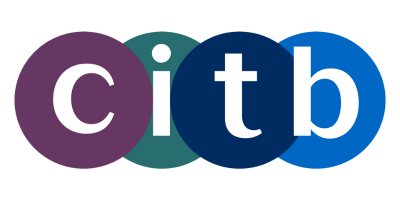Green Skills Lab: CITB
The Construction Industry Training Board (CITB) is the training provider for the construction sector in England, Scotland, and Wales. Its main purpose is to support the sector in developing a skilled, competent, and inclusive workforce, now and in the future.

The issue
The CITB recognises the climate emergency and the necessity of taking action to limit future global greenhouse gas emissions and harmful environmental changes. In 2022, the organisation conducted a materiality assessment and engagement process, hearing from key stakeholders about their desire to work together to achieve net zero and reduce environmental impact. Today, the organisation’s ambition is to achieve net zero across its entire business operation, as soon as possible, eliminating all Scope 1 and 2 emissions by 2030, and Scope 3 emissions by 2040.
The CITB understands that the transition to a sustainable future and meeting its own net zero emission targets requires a workforce with the awareness, knowledge and skills to bring about positive and impactful results. The organisation is investing in its employee learning and development offering so that all colleagues have the knowledge of ‘what’ and ‘how’ they can deliver their work to best support their environmental goals. Through this enablement, it is anticipated that all its products and services will have environmental considerations at the core of its development and ultimately benefit the wider construction industry.
What the company did
To enhance green capabilities within the workforce, the organisation divided its Green Workforce Plan into three levels: basic, essential, and technical skills. This approach has helped it to assess its teams’ and colleagues’ maturity according to the organisation’s needs, leading to new opportunities and actions that can be developed in both the short and long-term.
To assess the state of each of the three skill levels, with a particular focus on essential skills, the leads of the Green Workforce Plan conducted interviews with colleagues from Green Champions to Learning and Development and Standards Managers and reviewed training uptake. It also engaged with the Department for Education (DfE), its sponsor body, to understand the civil service’s approach to carbon literacy training and whether it was an approach the company should take.
Following this work, the CITB is gaining greater clarity on what is required to upskill its workforce and shape its Green Workforce Plan, in order to implement it in the coming years. Some of the actions include:
- Basic Knowledge: Internally promote existing resources and learning tools through an Environmental Communications Plan, raise awareness of key terms and definitions, and consider whether to become an accredited Carbon Literate Organisation.
- Technical Skills: Establish a Green Skill matrix for each team (utilising IEMA/Deloitte Greening the Workforce report where possible).
- Essential Skills: Review its internal Behavioural Competencies Framework to identify opportunities for improvement taking into consideration other frameworks such as the Skills Builder Partnership’s universal framework to develop progression pathways.
The CITB is committed to offering learning and development opportunities to all colleagues, while being transparent with regular internal updates on progress. The organisation hopes to raise more awareness of the actions that employees can take in their jobs and personal lives to help the environment.
Reflection on Green Skills Lab
“The Lab has helped us to consider the role of essential skills in enabling a Just Transition and have an awareness to undertake in-house mapping of our behavioural framework against other frameworks such as the Skills Builder Partnership”
“Reviewing technical skills of various teams will take time and therefore we shall focus effort on teams needing skills development more urgently i.e. engagement, finance, procurement, estates,” Green Skills Lab participant.

FAIRER, GREENER, TOGETHER

Related content
Green Skills Lab: SUEZ
How SUEZ is using innovative technologies to develop a more resource efficient Circular Economy.
Green Skills Lab: CITB
Find out about The CITB's ambition to achieve net zero across its entire business operation.
Green Skills Lab: British Land
How British Land makes supporting social mobility a priority.
